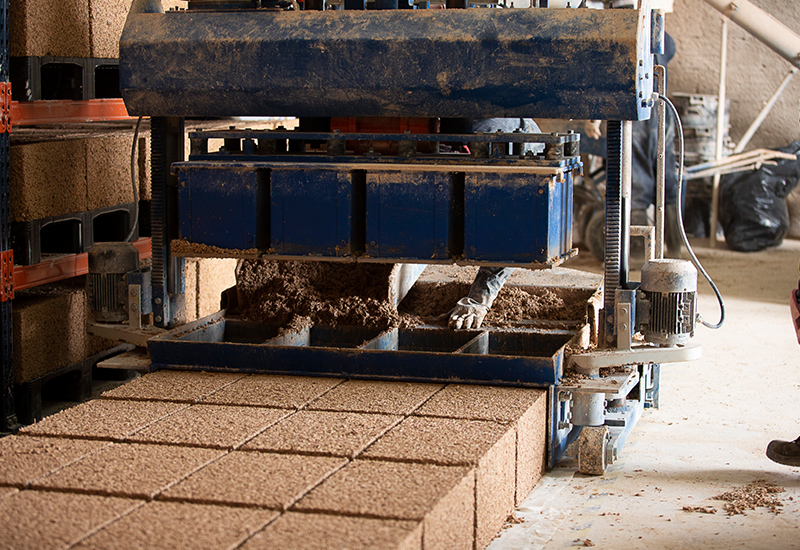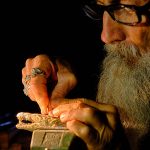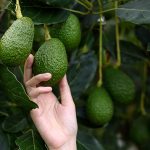If you are looking for a beautiful metaphor, it doesn’t get any better than this.
Four passionate entrepreneurs, two Palestinians and two Israelis, decided to leave behind one of the world’s most enduring conflicts, religious intolerance, and a corporate lifestyle to form a harmonious business based on their ecological convictions and friendship.
The result is Cânhamor, a carbon-neutral enterprise based in the Alentejo, which helps people build a living space with nature, not despite it.
I interviewed Elad Kaspin, co-founder of Cânhamor, which produces natural, sustainable alternatives to conventional building materials. Formerly a software engineer working in the hi-tech industry in Tel Aviv, he left his career 10 years ago to live a simpler and quieter life. He spotted that the Alentejo was on the rise and cheaper than the Algarve and became an amateur property developer from which he came to understand the challenges of building in Portugal.
He became fascinated with hempcrete – one of nature’s most miraculous building materials – and when he met with the other associates, they discovered a common purpose and friendship.
They started the project two years ago and spent the first year researching and developing the product. The raw hemp is mixed with hydrated and hydraulic limestone and clay. It is placed in a mixer and then pressed by a machine. After 24 hours, it is moved onto pallets to dry for two months without any heat, meaning zero emissions. On the contrary – during curing, the lime absorbs even more carbon from the air as it hardens. Together with the high efficiency of carbon sequestering of the hemp plant itself, these blocks are truly one of the most carbon-negative construction materials known to man.
Elad explains the benefits of this for the environment. “We are very close to achieving 100% zero-waste and zero carbon footprint in the production of our hemp blocks. Our block mix uses no chemical additives even though this lengthens the curing time.”

Elad with the hemp blocks
Although this building material has become popular in other European countries such as France, the Netherlands and Belgium, Cânhamor is excited to be the first and only manufacturer in Portugal.
“The superior, self-regulating thermal insulation properties of our blocks mean that you benefit from significant heating and cooling efficiencies in both summer and winter, saving you substantial energy costs for years to come” Elad tells me.
Hempcrete’s vapour permeability characteristics help regulate humidity and act as a natural repellent. This feature helps create significantly healthier living environments, free from toxins, viruses, bacteria and mould-producing spores. Cânhamor’s blocks have been rigorously tested in labs and are fully licensed. They will not burn even if placed next to a naked flame.
I spoke to another passionate convert to the cause, one of Canhamor’s factory workers Nuno Teixeira. He left behind a life in the city after becoming committed to sustainable living. “Working for Cânhamor has given me what I didn’t believe was possible: a comfortable living without taking from nature. This is a paradigm I didn’t think was possible.”


Like me, you are probably now reflecting on how expensive this building material will be. Think again. Nuno tells me that a hemp wall is the same price as a traditional building method using cork insulation. It also only takes one-third of the time to build when compared to a traditional technique, as you only need one single layer of blocks and no additional insulation layer. The hemp block gives you thermal insulation, fire and pest resistance and leaves behind the ‘traditional’ Portuguese concrete construction method, which is too hot in summer, cold in winter, damp and prone to mould. Building from hemp is also 100% natural. Even cork has chemical binders in it when it is made into insulation panels.
Their construction also does not require a special building contractor. Lighter than conventional bricks, they are easier to assemble and require no special machinery, while builders benefit from the material’s versatility. They are suitable for new builds and renovations, single dwellings or residential facilities and can also be used to provide insulation in existing structures. Not only that, but Cânhamor undertakes to supervise and assist with the construction process.


Prices would also come down further if the hemp did not need to be imported and this is where phase two of their scheme comes into play. “We are excited to spearhead a project to offer farmers a realistic business model for a sustainable crop”, Elad tells me. “By resurrecting the ancestral cultivation of hemp in Portugal, farmers can profit from an ecologically beneficial crop that will not erode the soil of their fields. As we forge partnerships with the local agricultural community to grow the hemp that we will use to make our blocks, we hope to contribute to a revolution in the farming practice of the Alentejo region and all over the country.”
Although farming is a conservative industry, the new company has invited farmers who have experimented with the crop on a small scale to share their experiences with other local farmers. Hemp regenerates the soil, is a natural repellent and uses very sparse water, so it is beneficial all round. Elad hopes to eventually have the resource of 1000 hectares planted to hemp to make Portugal a new hemp hub in Europe.
Their enterprise was supported by the mayor of Ourique, Marcelo Guerreiro, who recognised the importance of new investment in the area. The new business will create 30 new jobs in Ourique after settling in Garvão, where they are building a new factory to help reduce production costs. This facility is the first and only manufacturer of hemp and lime blocks on the Iberian Peninsula.


Not content with growing their business, Elad is also keen to get the word out there about the highly sustainable properties of hemp. On 19 November, Cânhamor was the main sponsor of Cannadouro in Porto. This year the conference hosted a new event, the Cannadouro Hemp Meeting: a day of talks with international speakers from various areas within the industrial hemp industry, of which Elad was one. Elad has also been interviewed by the BBC about the project.
With so many pros and no apparent cons, it seems inevitable that both Cânhamor and a new hemp crop will flourish in this region, bringing a healthier and more sustainable future.
Facebook, Instagram or LinkedIn













